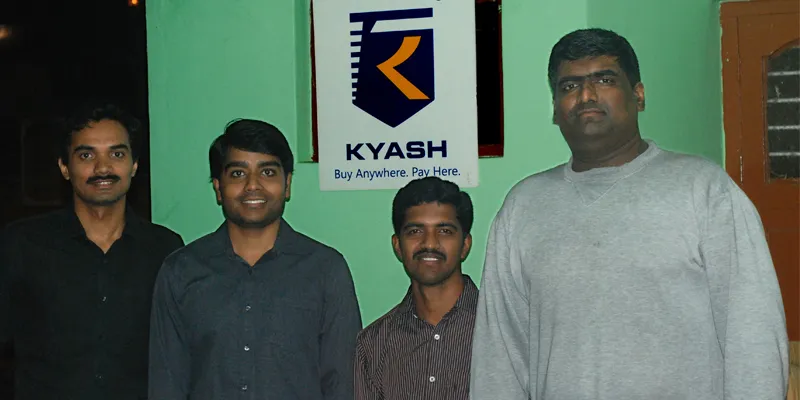Kyash helps businesses collect cash payments through its network of 15,000 payments points
A fintech startup focussed on bridging India and ‘Bharat’; the online with the offline; cutting-edge with old school principles — that's how cofounder Vinuth Madinur describes Kyash, a venture that provides means for businesses, especially e-commerce ones, to collect cash payments through a country-wide network of retail outlets.

‘Can you ignore the cash-paying customer,’ asks its website, noting that less than five per cent of Indians pay online.
Kyash solves the problem of lack of viable offline payment options noticed by it four founders by tying up with existing bill payment and ticket booking shops — a wide network of more than 15,000 trusted and net-connected payment points — and allowing any business, online or offline, to collect cash payments via the shops.
"Kyash provides an automated and secure cash collection mechanism for online businesses, which was otherwise absent,” Vinuth explains, adding, “we are also trying to replace the cheque/DD payments that a lot of offline businesses rely on”.
So customers can make cash payments towards any business just as they would pay their bills or recharge mobiles at a neighbourhood shop.
Bengaluru-based Kyash has already established a network across 1,000 towns and cities. The businesses just have to integrate Kyash into their website like a payment method. “Any business that has a lot of remote purchases can use Kyash. They need not be online. They can be taking orders over a phone call or SMS,” says Vinuth.
How it works
Kyash, which the founders say is 100 per cent safe, integrates the payment option on the checkout page. Anyone who wants to pay via Kyash is given an eight-digit ‘KyashCode’ and the list of nearby outlets (based on pin code) where the payment can be made. Once the person pays, the merchant is updated real-time.
How it started
Founders Vinuth and Sandeep Koujalgi, who put in their savings into the venture, started working on Kyash almost two years ago, and much of the time was spent on building a network of shops and figuring out what works and what doesn't.
Kyash was finally launched as beta in March, and the foursome soon realised they needed to provide ready-to-use plugins for website owners to integrate Kyash easily.
“We now have ready-to-use integration for Magento, Open Cart, Woo Commerce, Shopify, KartRocket, and PrestaShop. We are live on about 10 e-commerce websites, with several more in the pipeline,” Vinuth says.
Vinuth observes that the startup’s network of 15,000 shops is too small a number for India: many of their customers who opted to pay via Kyash couldn't find a shop nearby. “So we have decided to take a step back and are focusing on expanding our network. We are now on our way to having more than 80,000 shops by end of November,” he says, revealing that talks are on for several big-ticket tieups. “Our target is e-commerce ventures selling services, products or subscriptions that are looking to scale beyond online paying customers,” he adds.
How it is different
What has Kyash, which charges a transaction fee from merchants, added to this segment of platforms? The founder says they have brought a new payment method which is familiar to an overwhelming majority of India. "Of the internet users in India, less than five crore pay online, either via cards, net banking or wallets. With Kyash, we will enable the majority to transact easily without the need to maintain bank accounts, remember passwords or even require internet while making the payment," Vinuth says. He goes on to list the advantages of opting for Kyash’s services: little-to-no customer onboarding process, no change expected change in customer behaviour, highly-scalable model and access to multiple bill-payment networks to give deeper reach to businesses.
Vinuth believes that over the next decade, as internet penetration increases, over 40 crore internet users in India will continue to pay by cash or other offline modes. And cash-on-delivery already supports e-tailers in a big way. Excluding utility bill and travel aggregators, Kyash is the first mover in this space, he says, adding that in the next few years, there may be more players emerging with different models of service.
Growth amid competition
The founders consider, more than individual companies, other payment methods such as cards, net banking, wallets, cash-on-delivery etc. as competition. To promote Kyash, they plan to work extensively with other players in the payment ecosystem. They also aim to focus on cases that are typically not served by other platforms. "For example, supporting cash payments in non-COD areas, for online services, digital goods etc," explains Vinuth.
The other big challenge is to build trust and a relationship with networks and stakeholders. "Various factors will go into building this trust, and it can only be built over the long term through customer-oriented culture and processes," he adds.
The startup is also looking to raise funds, mainly to strengthen the product and network. "With increasing internet penetration and e-commerce businesses being driven more and more by smaller towns and cities, Kyash will become more relevant. We expect the growth to be online, on par with the e-commerce growth in India," says Vinuth.







